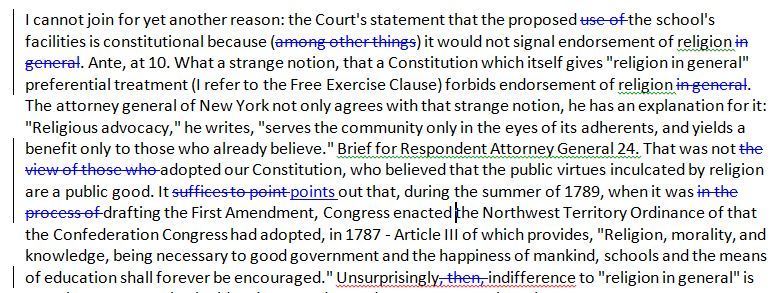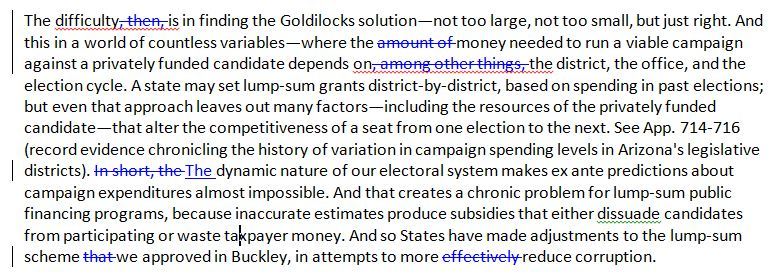WordRake is a new editing program created specifically for lawyers. An add-on to Microsoft Word, it “rakes” your documents in search of unnecessary and obtuse words, suggesting edits to improve clarity and concision. It is the creation of Gary Kinder, a lawyer and writer whose 1998 book, Ship Of Gold In The Deep Blue Sea, went to number seven on The New York Times bestseller list.
What better way to test WordRake, I decided, than to use it on two of the most eloquent writers on the Supreme Court, Justice Antonin Scalia and Justice Elena Kagan. Together with Bryan A. Garner, Scalia is the author of two books about legal writing, Reading Law: The Interpretation of Legal Texts, and Making Your Case: The Art of Persuading Judges. Kagan received praise from Jeffrey Rosen in The New Republic for her “emergence as an eloquent voice” on the court. As an example, he cited her dissent in the 2011 case, Arizona Free Enterprise Club v. Bennett.
If WordRake could improve on Scalia and Kagan, imagine what it could do for the rest of us, I thought.
Rosen calls Scalia the court’s “most dazzling writer.” To illustrate his point, he quotes a sentence from Scalia’s concurring opinion in the 1993 case, Lamb’s Chapel v. Center Moriches School District.
Like some ghoul in a late night horror movie that repeatedly sits up in its grave and shuffles abroad, after being repeatedly killed and buried, Lemon stalks our Establishment Clause jurisprudence once again, frightening the little children and school attorneys of Center Moriches Union Free School District.
Taking my cue from Rosen, I pasted Scalia’s Lamb’s Chapel concurrence into a Word document and ran it through WordRake. First, I downloaded the free, three-day trial of the software and installed it in Word. This takes just a few moments, after which WordRake appears on the Word menu. Highlight a selection of text, select “Rake” from the WordRake menu, and the program begins to scan the document. When it is done, you can review its suggestions and accept or reject them.
Here you see WordRake’s treatment of the opening paragraph of Scalia’s concurrence:

Here, WordRake has succeeded in improving Scalia’s prose. It deletes both “generally” and “in this regard” as unnecessary words. It smooths out “a violation of” to “violating” and does the same for “the showing of” to “showing.”
In this next example, WordRake does not perform as admirably.

Several of WordRake’s suggestions here are simply wrong. In the first line, it changes “the proposed use of the school’s facilities” to “the proposed the school’s facilities.” Later, it changes, “That was not the view of those who adopted our Constitution,” to, “That was not adopted our Constitution.” Then, it changes, “It suffices to point out that,” to, “It points out that.” Other changes are more matters of style than of wrong or right, such as deleting “then” from the phrase, “Unsurprisingly, then, indifference ….”
I decided to try another Scalia sample, the majority opinion in the 2008 Second Amendment case, District of Columbia v. Heller. After reviewing the roughly 17,000-word opinion, WordRake was fairly modest in its suggestions for Scalia. Many of the suggestions were repetitive, such as changing every instance of “insofar as” to “where,” “the use of” to “using,” and “makes clear” to “clarifies.” In at least one instance, WordRake’s suggestion changed the meaning of the phrase.

Where Scalia wrote, “Since those discussions took place 75 years after the ratification of the Second Amendment, they do not provide as much insight into its original meaning as earlier sources,” WordRake would change that to, “Since those discussions took place 75 years after the ratification of the Second Amendment, they provide as little insight into its original meaning as earlier sources.” Scalia is saying that the earlier sources provide greater insight but WordRake puts the earlier and later sources on a par in providing “little insight.”
For Kagan, I again took my cue from Jeffrey Rosen, testing WordRake using her dissenting opinion in Arizona Free Enterprise. WordRake uncovered no major “gotchas” in Kagan’s writing. The following paragraph is a good example of its review:

These are stylistic judgment calls. Do you want to say, “The difficulty, then, is …,” or, “The difficulty is …”? What about, “In short, the dynamic nature,” versus, “The dynamic nature …”? WordRake cuts words of transition that, while not necessary, arguably help the flow. WordRake is correct in pointing out that “the amount of money needed” can be shortened to “the money needed,” but it is wrong in suggesting the deletion of “effectively” in the last line.
WordRake does make some minor improvements to Kagan’s prose. Among its suggestions are to change “does not restrict any person’s ability” to “restricts no person’s ability”; “subsidies … do not restrict any speech” to “subsidies … restrict no speech”; and “who presumably would not be able to” to “who presumably could not.” It regularly deletes transitional phrases such as “for this reason” and “to the contrary.”
Fearing that I had not been fair to WordRake by pitting it against two of the legal profession’s most accomplished writers, I decided to try it on a random contract. I went to the wireLawyer site that I wrote about last week and found a 124-page El Pollo Loco franchise agreement. I downloaded it as a Word document and ran it through WordRake.

Above is a typical paragraph, as edited by WordRake. The more you use the software, the more you see how it works. It searches for phrases lawyers often use — such as “in addition to,” “pursuant to” and “in accordance with” — and suggests simpler words such as “besides” and “under.” It is programmed with a set of usage and grammar rules and applies those rules to the document.

Above is another example from the franchise agreement. The suggestions are mostly improvements, but note that the final deletion would alter the meaning of the sentence.
WordRake does not have a has no brain. It is unable to discern meaning, context or color. In its mechanical application of rules, it risks changing the meaning of a sentence or phrase.
Still, WordRake was able, in some instances, to improve the writing of linguistic legal luminaries Scalia and Kagan. If it can help them, chances are it can help you. The important lesson from the above examples is to use WordRake with a critical eye. Review each suggestion and consider whether it helps or hurts. Clearly, it is capable of doing either.
WordRake is sold on a subscription basis. A one-year subscription is $99. Quantity pricing is available. As I noted at the outset, you can download a three-day free trial.
In my opinion, at $99, WordRake is sensible purchase. Think of it as an extra layer of review for your writing or even as a sort-of robotic writing teacher. See its suggestions for simplifying text often enough and they may become second nature. Use it for a year and, who knows, you may learn enough that you will not need a second year.
 Robert Ambrogi Blog
Robert Ambrogi Blog